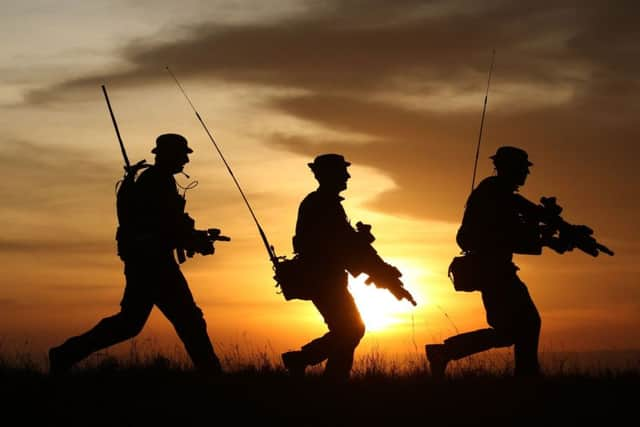MPs: demand for mental health care for veterans and troops has doubled
and live on Freeview channel 276
The House of Commons Defence Committee report published today warned that it is still taking “too long” for veterans to access treatment, with some falling through the gaps and availability of care varying in different parts of the UK.
The report found that veterans in NI suffer worse than the rest of the UK across a range of indicators;-
Advertisement
Hide AdAdvertisement
Hide Ad• There are difficulties implementing the Armed Forces Covenant - a national promise to ensure fair treatment for forces personnel and veterans - due to NI equality legislation


• There is much less data collected on veterans here compared to the rest of the UK - the NHS collecting none.
• Mental health teams are much smaller than in England
• Veterans choose not to disclose their military past to GPs due to security fears
• There are no statutory veteran-specific services and no special care in mainstream services.


Advertisement
Hide AdAdvertisement
Hide Ad• Veterans are therefore reliant on the Armed Forces charity sector - which is “less developed” than in Britain
• Academic studies on veteran mental health have only begun in NI
• The annual Ministry of Defence of veterans survey excludes NI
• The political situation in NI means officials currently representing it on the Veterans Board - which implements the Covenant on health care, housing, education, and employment - had no involvement in the key aspects of service delivery, including mental health care.
Advertisement
Hide AdAdvertisement
Hide Ad• It is most likely that NI veterans will have higher rates of mental health conditions than Britain because even the civilian population here does so
The report said Professor Cherie Armour of Ulster University told MPs that “about 8.8% of the civilian population in NI have experienced Post Traumatic Stress Disorder, compared to 4.4% in England. As veterans have broadly similar rates of PTSD to their civilian counterparts, she suggested that Northern Irish veterans will therefore also have higher rates than the rest of the UK”.
The report found that “it is still taking too long for veterans to access treatment when they need it, and levels of care vary across the UK”.
It concluded that the principle enshrined in the Covenant that veterans should receive priority treatment for service-related conditions is “inconsistently applied” across the UK, with “palpable confusion” about how it should be implemented. This has created an impression that the health service is “failing veterans”.
Advertisement
Hide AdAdvertisement
Hide AdOfficial Ministry of Defence figures showed that 3.1% of serving personnel are diagnosed with mental health conditions, twice the proportion seen in 2008/09.
But the committee warned that the number of veterans with conditions such as post-traumatic stress disorder (PTSD) or depression could be three times higher, at about 10%, amid concern that some may not seek help because of stigma.
The MPs’ report confirms findings of a JP investigations FOI analysis of 30 health trusts across England, published last week, which suggested the caseload of veterans receiving treatment for mental health conditions may have doubled since 2012/13.
The committee report also confirmed virtually all the anecdotal findings by JP Investigations regarding the particularly dire plight of veterans in NI, for political and security reasons.
Advertisement
Hide AdAdvertisement
Hide AdThe MPs also found deployment to combat roles in Iraq or Afghanistan “clearly increased the likelihood of mental health conditions”, with one 2014 study finding PTSD levels of 6.9% among regular troops and 6% among reservists.
Other groups who are potentially more vulnerable to mental health problems include female personnel, those who leave the service early and those recruited below the age of 18, said the report.
But the cross-party MPs’ committee said it was “not only wrong but harmful” to think that most servicemen and women are damaged by their experience in the military, stressing that the “vast majority” leave with no mental problems.
The report said that media coverage and publicity by armed forces charities had helped create a “distorted” public perception of the extent of the problem which could be increasing stigma.
Advertisement
Hide AdAdvertisement
Hide Ad“Rather than causing problems, military service can have a positive effect on an individual’s mental health,” said the report.
“Too much attention” may be being paid to PTSD, when conditions like depression are actually more common, it said.
Committee chairman Julian Lewis said most veterans have no mental health issues.
“But the MoD must ensure that the few who do develop mental health problems are receiving the level of care promised to them in the Armed Forces Covenant. At the moment they are not, and we shall examine the situation in more detail in our follow-up inquiry, launched today.”
Advertisement
Hide AdAdvertisement
Hide AdMeanwhile, a former MLA whose soldier husband was killed in Afghanistan has revealed that one of the last conversations she had with him “was about his concern for a rise in suicide amongst serving soldiers”.
Brenda Hale OBE was speaking about her husband Captain Mark Hale, 42, who died in a bomb blast in 2009.
MOD statistics place suicide rates in the Army at 9 per 100,000, the largest of all HM Forces, yet there appears to be no detailed research as to why, she said. “Where and whom do they turn to when our mental health teams do not recognise the symptoms of PTSD in the forces community?”
“There are facilities in England and Scotland that offer residential support, but we urgently require that in Northern Ireland.”
Advertisement
Hide AdAdvertisement
Hide AdThe implementation of the Armed Forces Covenant in Northern Ireland as in the rest of the UK has been frustrated by equality legislation, so the armed forces must be made exempt in the same way as the Catholic Council for Maintained Education and the Travelling Community, she said.
While Sinn Fein withhold a functioning assembly, the Prime Minster must fulfil her promise the Covenant “will be rolled out across the UK” she added.
• The series on veterans mental health and suicide rates continues all week
HELPLINE NUMBERS;-
UDR/RI aftercare: 9042 0145
UDR Ben Fund: 028 9042 0652
Royal Irish Ben Fund: 9042 0629
Veterans UK (MoD pensions/compensation): 0808 1914218
The Samaritans: 116123
Lifeline NI 0808 808 8000
Alcoholics Anon: 0800 8177 650
Vets’ Gateway: 0808 802 1212
Combat Stress: 0800 138 1619
Help for Heroes: 01980 844280
RBL: 0808 802 8080
SSAFA: 080 731 4880